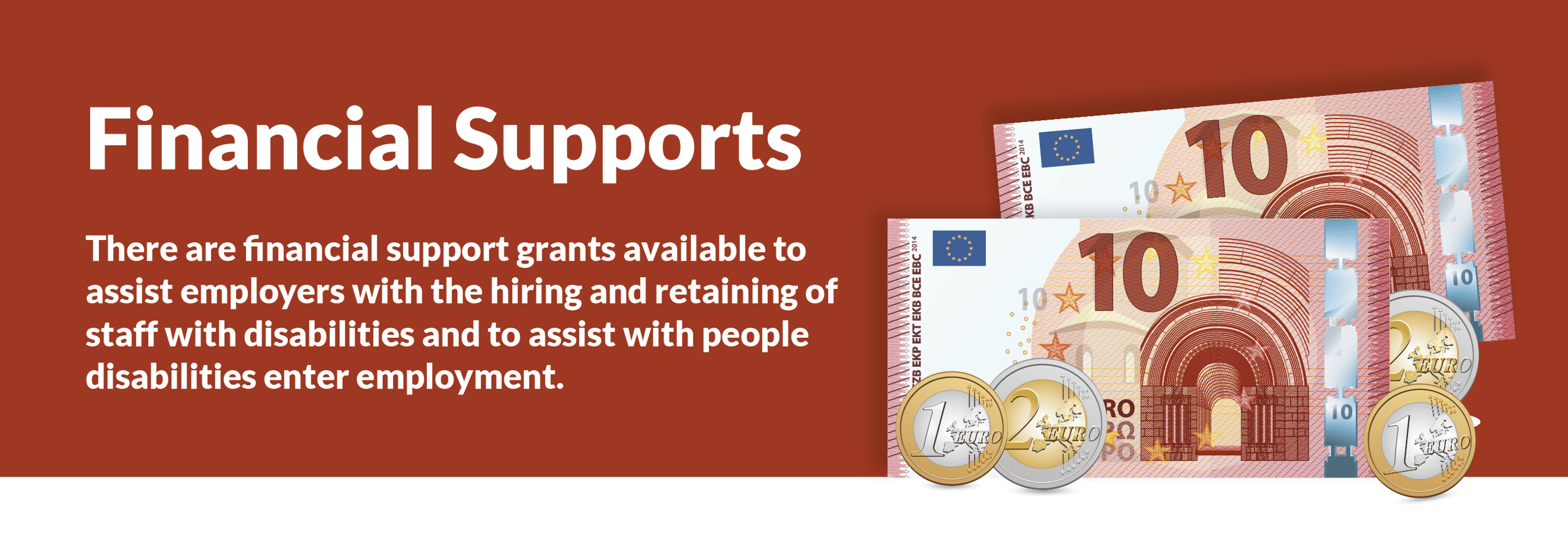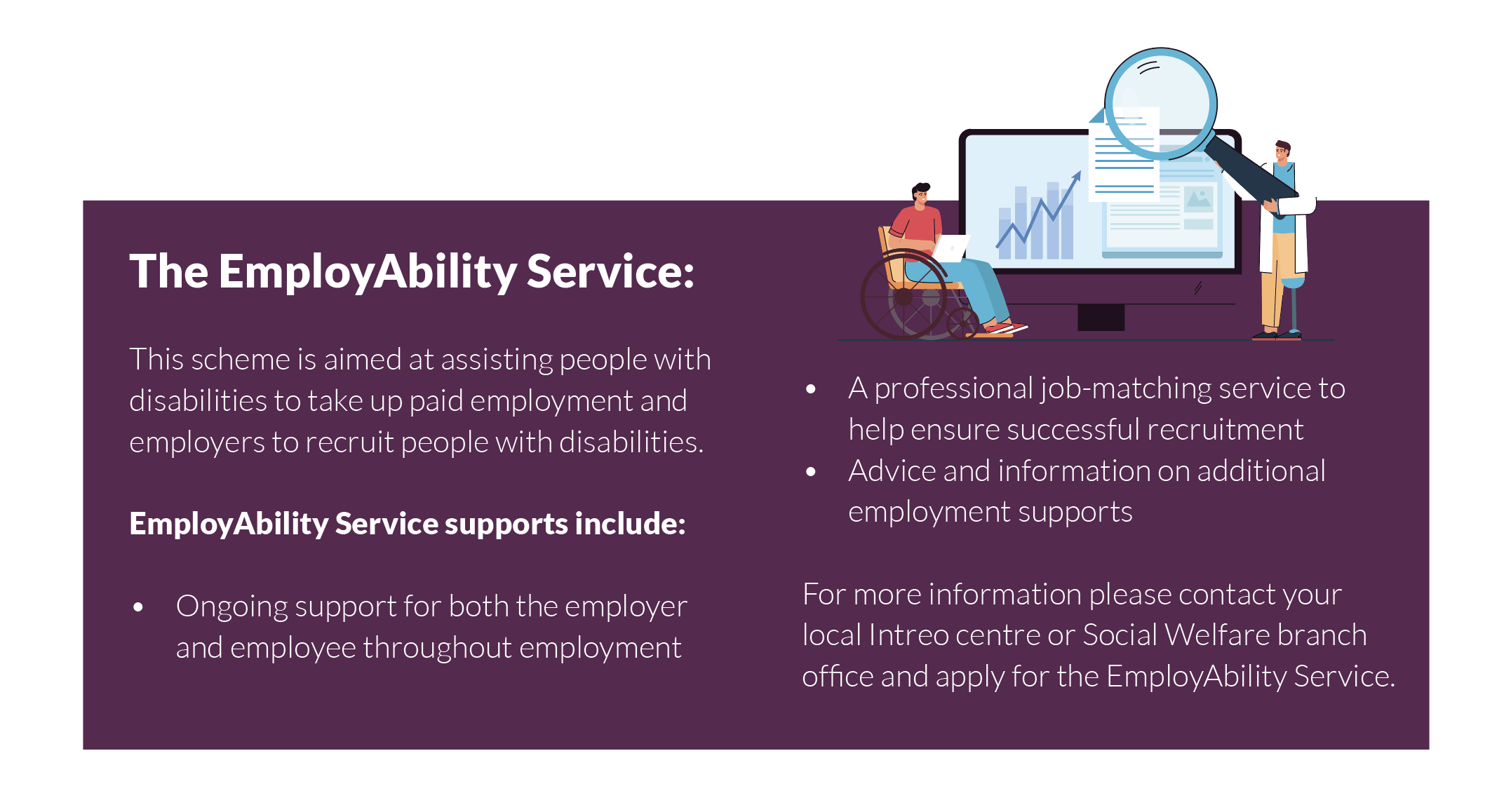Employment and Disabilities
A Guide to Available Supports
In Ireland there are approximately 650,000 people living with a disability. Research shows that people with disabilities have far fewer employment opportunities when compared to their non-disabled peers. Less than half (44%) of people with a disability of working age were employed in 2019 (CSO 2021 report). In Fianna Fáil, we believe in equal opportunities in the workplace for all. We believe there is a strong business case for hiring people with a disability. By employing someone with a disability, employers are building and retaining a team that best reflects the community around them. Employees with a disability add value to teams by bringing a range of skills, talents and abilities that the traditional workforce may not have. This guide outlines supports that are in place for employers to hire people with disabilities. Further information on all covered in this newsletter is available from your local social welfare office and the Department of Social protection.
Employers should aim to implement best practice for all employees, whether they are a person with a disability or not. In relation to employing people with disabilities, best practice includes:
- recruiting a diverse and inclusive workforce,
- providing disability awareness training,
- ensuring premises are accessible,
- ensuring that company policies are inclusive and accessible (Handbook, PEEP/ Health and Safety),
- providing accessible technologies.

Job Description: The first step in any recruitment process is the Job Description or Advertisement. To encourage the employment of people with disabilities, develop a competency based job description, outlining the tasks involved in the role as opposed to type of person who should apply.
Applications: Flexibility in how someone can apply for the role is a key positive action for people with disabilities. Jobseekers and employers rely heavily on online recruitment, so make sure your hiring site is accessible for all. Welcome applications from people with disabilities by stating that you accommodate the needs of candidates with disabilities.
Shortlisting: CVs and applications of people with disabilities can look different to other applicants and they may have gaps, less work experience and alternative qualifications. When shortlisting, consider stating that applicants who meet the qualification requirements and have disclosed a disability on their CV or application form will be automatically invited to interview. This will communicate your commitment to inclusion and encourage the disclosure of a disability.
Testing: Some companies use assessment centres and online testing. These tools can be a barrier to applicants with disabilities, in particular non-visible disabilities. Consider whether you can waive this requirement for applicants with a disability.
Interviews: Make sure the interview location is fully accessible. You don’t need to change your interview process, just ensure it is competency based to get the best result. Ask all candidates the same open and direct questions about their ability to perform the functions of the role. Be open-minded as to how the job can be done – people with disabilities will approach tasks differently.

There are financial support grants available to assist employers with the hiring and retaining of staff with disabilities and to assist with people disabilities enter employment.
Grants to retain employees with disabilities
This scheme aims to help employers to retain employees who acquire an illness or impairment that affects their ability to carry out their job. Grants of up to €2,500 or 90% of costs associated with hiring a specialist to evaluate the employee's occupational capacity, to carry out the workplace or job assessment and to develop a retention strategy are available. On completion of this, a further grant of up to €12,500 is available for implementing the retention strategy ie training, redeployment, job coaching.
Disability Awareness Support Scheme
Employers in the private sector that provide disability training for their staff can apply for a grant of up to €20,000 as part of the Disability Awareness Support Scheme. This training helps employees develop a better understanding of the key issues regarding disabilities in the workforce. An additional €650 grant is available for training materials.
Workplace Equipment Adaptation Grant
The Workplace Equipment Adaptation Grant of up to €6,350 is available to employees with disabilities, employers and self-employed people with disabilities who need to make adaptations to their workplace or purchase specialised equipment.
The Personal Reader grant is made available to blind or visually impaired employees that require some extra assistance with reading printed material at work. The grant aid is a fee per hour in line with the national minimum wage for a maximum of 640 hours per annum. You do not have to be registered blind, or have a specified level of sight loss to qualify for a Personal Reader Grant. If you are experiencing difficulty with reading at work for reasons of visual impairment, then you are entitled to apply for this grant.
Job Interview Interpreter Grant
If you are a jobseeker who is deaf, hard of hearing or have a speech impairment and you are attending job interviews with private sector employers, you may apply for funding to havea sign language interpreter, a lip speaker or another interpreter attend the interviews with you. You can apply for funding to employ an interpreter for each job interview you attend. You can also get funding to cover the costs of employing an interpreter to help you when you start work (during your induction)
The grant available is for an interpreter for a half-day session for interviews (up to three hours). The rate ranges from €95 to €205, depending on the duration and the interpreter’s qualifications plus reasonable travel costs.
Wage Subsidy Scheme for people with disabilities
The Wage Subsidy Scheme (WSS) offers financial support for employers who employ people with disabilities. Sometimes a disability can restrict an employee's productivity compared to other staff, regardless of their ability to do a job. In this case, the Wage Subsidy Scheme (WSS) makes up the shortfall in productivity directly to the employer (who pays the employee as usual). Employers who employ staff with disabilities, with proven productivity rates of 50-80%, will not lose out as the subsidy makes up for any shortfall in productivity. The Scheme is available to private sector employers who can employ workers with a disability between 21 and 39 hours per week on a minimum of 6 month contract. The employer pays the employee the going rate for the job. The employer is then paid a subsidy of €6.30 an hour for the hours worked. The maximum annual subsidy to the employer is €12,776, based on a 39-hour week. This can vary if the employer is employing more than one person with a disability.
This grant is administered by the Department of Social protection and more information is available online via www.gov.ie/wage-subsidy-scheme
